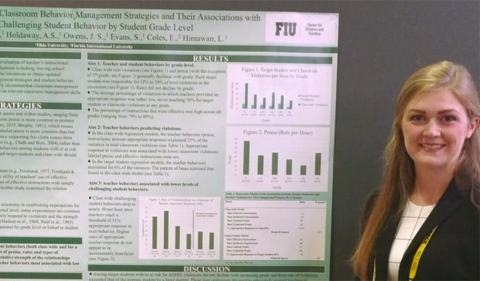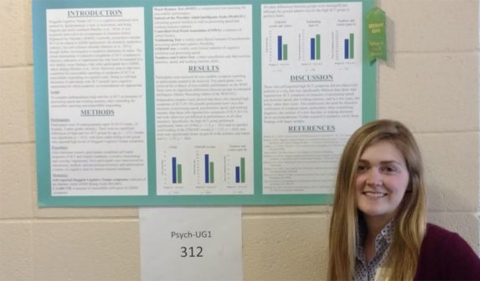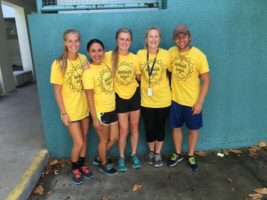
Jessica Smith presents a research poster at the Association for Behavioral and Cognitive Therapies (ABCT) convention.
Senior Jessica Smith ’18 has known since high school that she wanted to earn a Ph.D. in clinical psychology, and her impressive academic and professional achievements at OHIO are helping her to reach her goal.
“I’m interested in the assessment of neurodevelopmental disorders,” Smith says. “I have researched a lot about ADHD, and I have a growing interest in autism, especially autism assessment. I would love to use neuropsychological assessments, and I have the opportunity to explore these interests at OHIO.”
Smith works in two research laboratories at OHIO—the Center for Intervention Research in Schools (CIRS) with Dr. Julie Owens and the Clinical Neuropsychology lab with Dr. Julie Suhr. Remarkably, Smith began working in both of these labs as a sophomore. Smith notes, “My adviser, Dr. Susan Tice-Alicke, helped me arrange my schedule and coursework so I could begin early.”
‘I Have Never Felt Like a Cog in the Wheel’
In her CIRS lab research, Smith often meets weekly with Owens to research and discuss their work on the Project to Learn about Youth (PLAY). Specifically, Smith is studying tic disorders among adolescents; she is using this research to write her honors thesis, eventually hoping to submit it for publication.

Jessica Smith presents her work on Sluggish Cognitive Tempo at a student research expo.
In the Clinical Neuropsychology lab, Smith is researching Sluggish Cognitive Tempo. “It’s been debated in the literature,” Smith notes. “Dr. Suhr, the other research assistants, and I are trying to help determine whether or not it should be its own disorder in the DSM.”
“Dr. Owens and Dr. Suhr have both invested more in me than I could have asked for,” Smith says. “They have helped me with advising, research, and so many other things. With them, I have never felt like a cog in the wheel, like some students at big universities do. Dr. Owens and Dr. Suhr made sure I was invested in the bigger picture of our research and lab work.”
Preparing for Graduate School, Presenting her Research
Her professors’ assistance has also extended to Smith’s graduate school preparation.
“The psychology faculty are well-aware of my goals. I meet with both of these professors, as well as my adviser, Dr. Tice-Alicke, about the graduate school application process. They are helping me choose programs and build my C.V.,” Smith explains.
Because of their assistance and guidance, Smith is on track to graduate on time. She is also building her professional experiences and sharing her research with peers and professors around the country.
In October, Smith presented her work at the Association for Behavioral and Cognitive Therapies convention in New York City. This presentation was a part of a paper that Smith co-authored, which has been accepted for publication in a journal.
“It was so exciting to share our research, and to network and connect with professionals in the field,” Smith remarks.
Smith also gave a speech at John Carroll University in April, where she shared the work she has been doing in Suhr’s lab. “I felt comfortable speaking about what I knew,” Smith says. “That data will really make an impact when it is finished.”
Putting Skills to Use as a Summer Camp Counselor
Smith has also worked as a camp counselor at the Summer Treatment Program, a nationally recognized organization that assists children who have ADHD and conduct disorders.
“STP is a 10-week camp where children can learn behavior management strategies, classroom skills, and self-efficacy,” Smith explains. “The camp also emphasizes strategies for improved social skills, where children make friends through sports and other activities.”
At STP, Smith was able to put her research and classroom skills to use. In her interactions with campers, she utilized behavioral therapy techniques to reinforce good behavior; the children earned “points” for positive behaviors such as sharing, raising hand their hands, and not interrupting, Smith states.

Smith (center) with her follow STP counselors
The counseling staff used this information to track the children’s progress.
“Every day after work, we determined whether each child’s behavior was improving, and we came up with awards like ‘best listener’ and ‘best sportsmanship’ to encourage the kids,” Smith remarks.
For the campers, STP was a remarkable experience. “It’s so rewarding for us as camp counselors to see how the STP has positively improved their lives,” she says.
A Strong Foundation in OHIO Coursework
Smith’s research, presentations, publications, and clinically relevant experiences have their basis in the excellent instruction she has received at OHIO. She notes that she has taken at least two psychology courses every semester, which has helped her become immersed in the field and move toward an on-time graduation.
In addition to her research and work with Drs. Owens, Suhr, and Tice-Alicke, Smith credits her success to her psychology classes as a whole.
Her interest in child psychology as an area of specialization was sparked in a course she took during her first year at OHIO—Child and Adolescent Psychology with Dr. Gary Sarver. “It was a really rewarding class, and I definitely enjoyed what I learned there,” Smith says.
Smith also cites Advanced Statistics with Dr. Bruce Carlson as an especially beneficial course.
“It was very challenging but so useful,” she remarks. “Dr. Carlson taught us to view psychology as more of a rigorous science, providing skills that have been relevant as I’ve continued working as a research assistant.”
Smith continues to hone her interests while keeping in mind her goals as a future clinical child psychologist.
“In high school, the reason I chose psychology was altruistic; I wanted to make the biggest impact possible. But since coming to OHIO, I have fallen in love with psychology both as a science and as a profession.”



















Comments